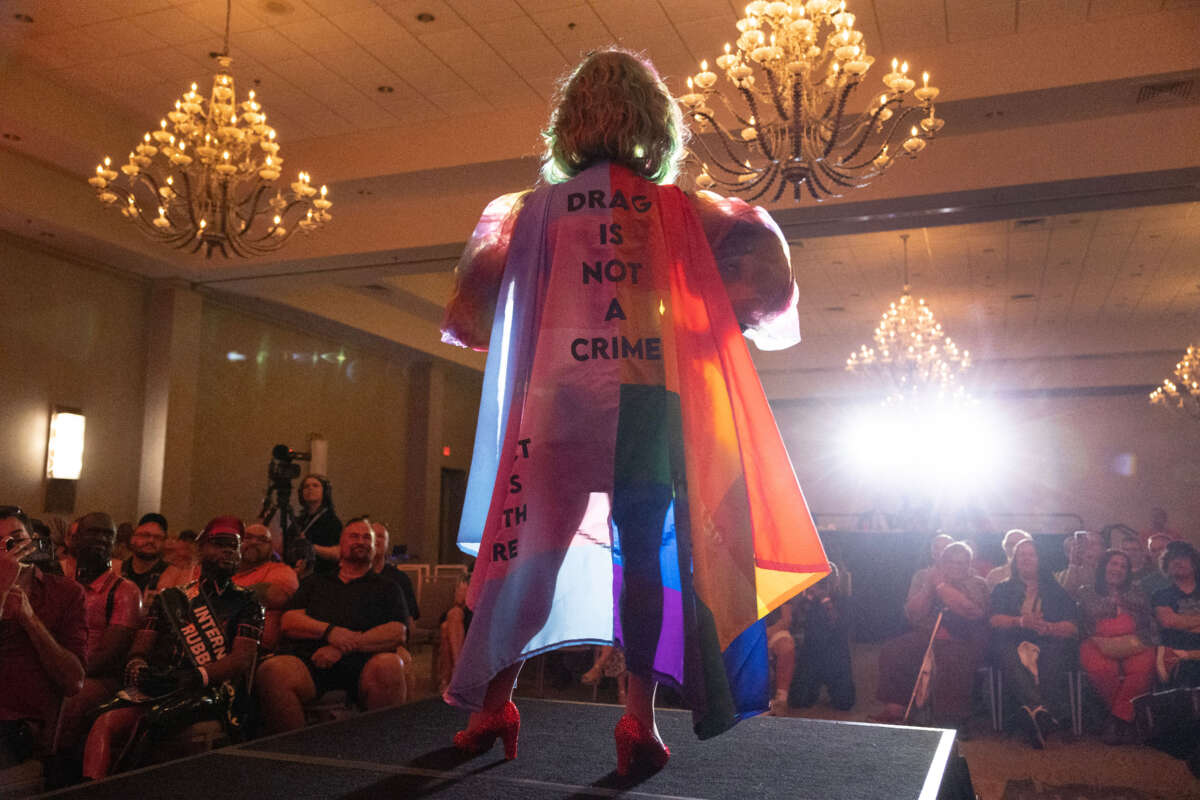Honest, paywall-free news is rare. Please support our boldly independent journalism with a donation of any size.
A federal judge has rebuked efforts by the state of Florida to block an injunction on the state’s ban on drag show performances.
The order from U.S. District Judge Gregory Presnell on Wednesday means Florida officials are now barred from enforcing a ban on venues that host drag shows in places where children may be present or nearby, pending the outcome of a lawsuit from one restaurant in the state that argues such a ban is unconstitutional.
In June, Presnell placed a stay on the ban, which was signed into law by Gov. Ron DeSantis (R) earlier this year.
Presnell blocked enforcement of the law after a restaurant that regularly hosts drag shows, Hamburger Mary’s in Orlando, filed a lawsuit alleging that the ban was overly broad and that it placed a chilling effect on First Amendment speech rights. The restaurant’s lawsuit stated that the law “prohibits protected speech based on the identity of the speaker” and wrongly targets drag shows that have become “part of mainstream culture.”
In a Facebook post in May, the restaurant noted that the ban was part of DeSantis’s broader attacks against LGBTQ people. “This bill has nothing to do with children, and everything to do with the continued oppression of the LGBTQ+ community,” they said.
Presnell’s June order, which accepted many of the arguments Hamburger Mary’s had made about the vagueness of the law, rejected notions that speech rights should be hampered on the basis that a select number of people might find a performance to be obscene, offensive or otherwise unsuitable for children. Rather, Presnell reminded the state that current laws on obscenity still allow officials to “protect children from any constitutionally unprotected obscene exhibitions or shows.”
The law in question, which barred minors from being able to attend drag shows with supposedly “lewd” performances, was written so broadly that even venues that hosted drag shows without sexual content would likely be affected.
The judge has also acknowledged that the state’s arguments for why the law needs to be enforced are inconsistent with how other state laws are enforced. The law — and arguments by the state that supposedly lewd shows should never be attended by children — “rings hollow when accompanied by the knowledge that Florida state law, presently and independently of the instant statutory scheme, permits any minor to attend an R-rated film at a movie theater if accompanied by a parent or guardian,” Presnell said in his original order last month.
Presnell reiterated this argument in his order this week.
State officials had wanted Presnell’s injunction to apply only to that restaurant, not other venues across the state that were seeking to host drag shows. The state had argued that taking the latter course of action would create a supposed harm to residents and to the state itself, as the statue was passed under the guise of protecting children.
Presnell rejected those arguments, however, noting that greater legal harm would come to those whose First Amendment speech rights would be violated by allowing the law to remain in place pending the lawsuit’s outcome.
Hamburger Mary’s “is not the only party suffering injury as a result of the passage of the Act; it has a chilling effect on all members of society who fall within its reach,” Presnell noted, adding in no uncertain terms that, “the balance of harms weighs heavily in favor of protecting Floridians from this unconstitutional statute.”
“Protecting the right to freedom of speech is the epitome of acting in the public interest,” Presnell concluded in his order broadening the injunction. “It is no accident that this freedom is enshrined in the First Amendment. This injunction protects [Hamburger Mary’s] interests, but because the statute is facially unconstitutional, the injunction necessarily must extend to protect all Floridians.”
Press freedom is under attack
As Trump cracks down on political speech, independent media is increasingly necessary.
Truthout produces reporting you won’t see in the mainstream: journalism from the frontlines of global conflict, interviews with grassroots movement leaders, high-quality legal analysis and more.
Our work is possible thanks to reader support. Help Truthout catalyze change and social justice — make a tax-deductible monthly or one-time donation today.
